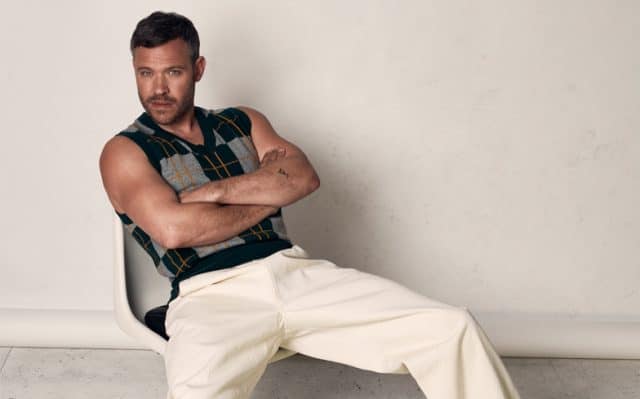
If you had found yourself in conversation with Will just 12 months earlier, the very idea of recording and releasing a new album wasn’t something he was interested in doing – possibly ever again. But then he got obsessed with an idea, one that he’s still fixated on. “I constantly have this thing in my head about being 40 and making a pop record. I don’t know why I was obsessed with it. I’m still slightly obsessed with it,” he says, perched forward on a leather sofa, picking away at his chicken salad. Why does he think that is, I ask? “I think it’s a bit of, ‘This is how it’s done, actually’. I don’t think it’s arrogance, but I feel like the industry can be ageist – more towards women – and I feel like, ‘Well, flip the table on it.’”
Those who have followed Will’s career since his 2015 album 85% Proof will know that he has kept himself busy with the success of his very good LGBTQ podcast Homo Sapiens. But the first inkling of this need to make a new record came to him after he starred in the West End production of Strictly Ballroom. While those big musical shows allow you to perform every night, Will explains, he missed the freedom and movement that having fun with his own music on stage gave him. He bowed out of the show last summer and immediately messaged his band mates to see if they’d be up for some new shows. They were up for it, but Will knew that in order for a promoter to agree to put on a new tour, there would have to at least be some new music.
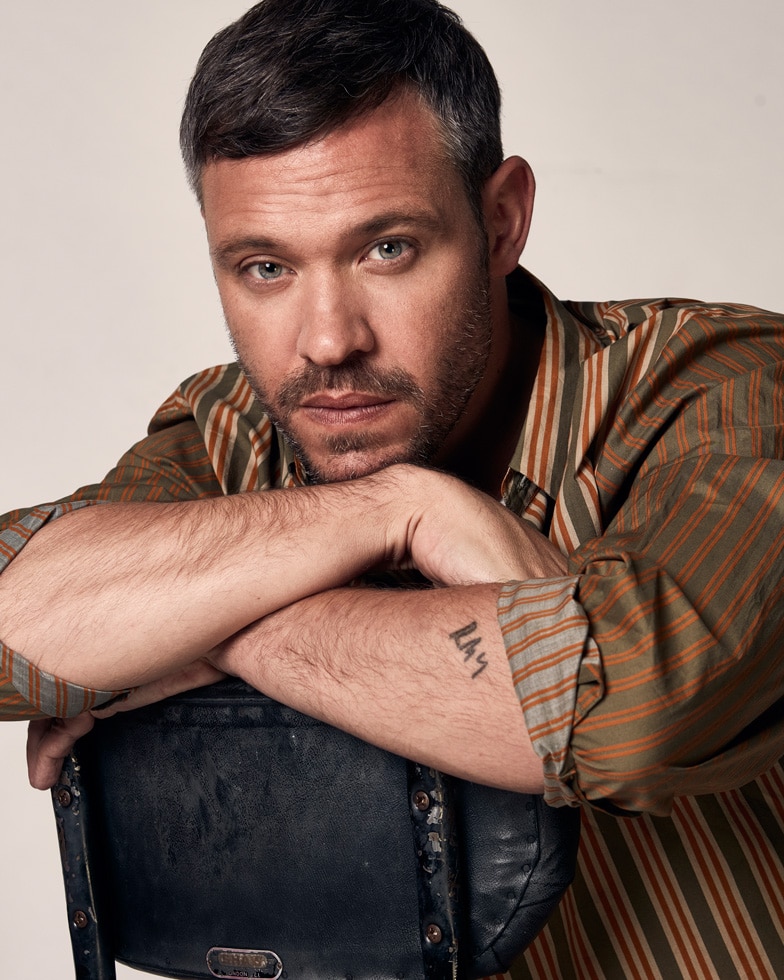
That quickly resulted in him co-writing his brilliant new single All the Songs, which he loved so much that it inspired him to suggest to his producer Richard X that they should actually do a full album. “I just wanted to do it really simply,” Will says. “I didn’t want to do it the way it had been done before. It was about eliminating things that are stressful for me, and extending the things that are joyful. I didn’t want to write all of the songs. There’s so many amazing songwriters out there, and I just hadn’t done it this way for about four albums. I didn’t really understand why. Every album I’d always say, ‘Oh c’mon, how many bloody amazing songs are out there?’ But because I’m more on my own, I can make it happen.”
When Will says he’s on his own, he means he doesn’t have any traditional music management like he had for the first 15 years of his post-Pop Idol career. Instead, he recruited an old promoter to help him find songs to record, which resulted in him listening to more than 200 tracks. “Weirdly, of course, because the stress is off I ended up writing the two singles,” he says. “Then I just reconnected with people I love, like Eg White who I’ve written with and basically gave me a career with Leave Right Now. He gave me a couple of songs.”
If the lyrics of heartache backed by that ebullient synth-heavy production on lead single All the Songs wasn’t a big enough clue, yes, Will does consider his new album Lexicon as the sequel to his 2011 collection Echoes. “That’s what I wanted. I think we all wanted it,” he says. “We were all like, ‘When are we going to do an Echoes part two?’ So it kind of is that. It’s a sequel, but six years on, so it’s a little bit different.” Next single My Love takes Will’s knack for a sad banger to new heights, while album cuts Scars and Ground Running are destined to become fan favourites. “I’m yet to write an out-and-out happy song with happy lyrics,” Will laughs. “I’ll always been drawn to that other side. It gives a song more pathos.”
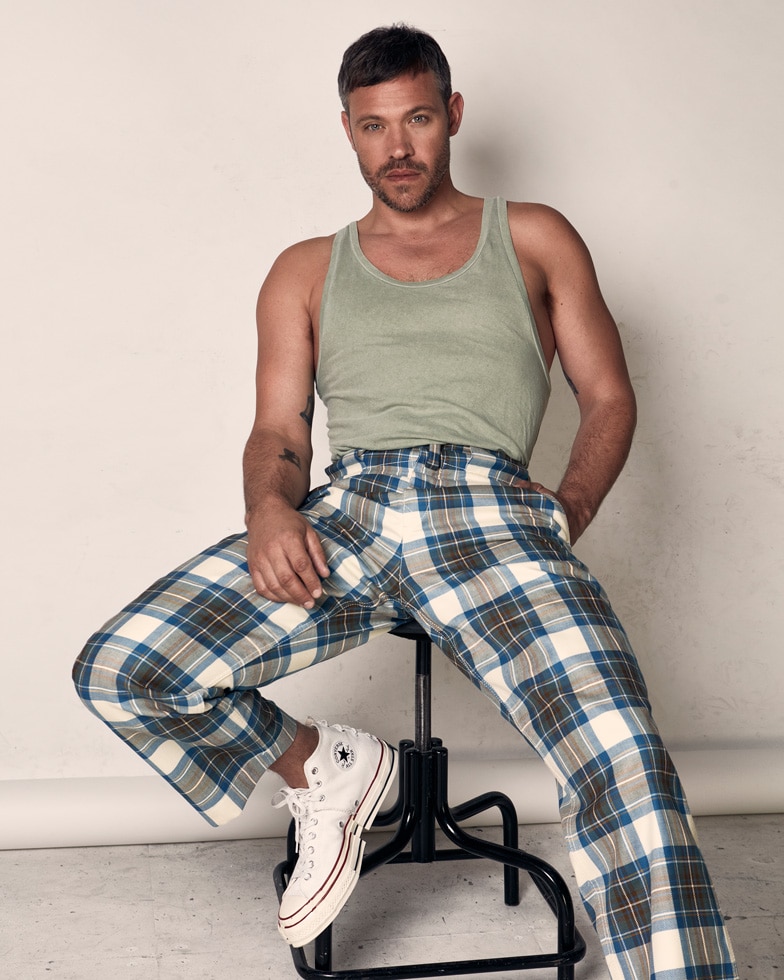
Will’s decision to take a step back from songwriting for the majority of Lexicon means that very little on the album comes from personal experience. However, his ability to interpret the pain and sadness within these songs is what will connect with listeners the most. He explains that he sees it as “just like doing an acting part,” conveying a three-minute story with all the emotion and delivery needed to achieve the full effect.
Even the album title Lexicon hasn’t come from something personal in Will’s life, but rather a more unexpected place. “I was watching a Judi Dench play on BBC iPlayer – it was an old TV play – and they mentioned the word ‘lexicon’,” he explains. “First of all I Googled it because I didn’t know what it meant. I found out that it was a collection of words – or a stream of words – and thought, ‘I quite like that.’” Will credits being signed to an independent label for the first time in his career as allowing him to really take charge of how he wanted to bring this project together. Cooking Vinyl took a step back, letting Will choose the songs, create the artwork, and even make the decision to get naked in the music video for All the Songs.
After 13 years of being locked into deals with major labels, Will agrees that he’s enjoying his newfound position of being signed to an indie. “I’ve never had a bad relationship with record companies,” he adds. “I’ve had the odd… they say something and it’s just like whatever. When I had Echoes out, and Jealousy was going to be the first single I was told by the person then, ‘You won’t get on radio unless you do something with Pitbull.’ They said, ‘You don’t have a hit here.’” If they had gotten him Pitbull, I ask, would he have done it? “I didn’t even know who he was! I was just like… fucking hell. But it makes you stick to your guns and go, ‘No, I think this is a hit.’ And it was. You have to have those moments I think, to show you how sure you are about what you’re doing. I haven’t had many of those moments. And with Cooking Vinyl, not at all.”
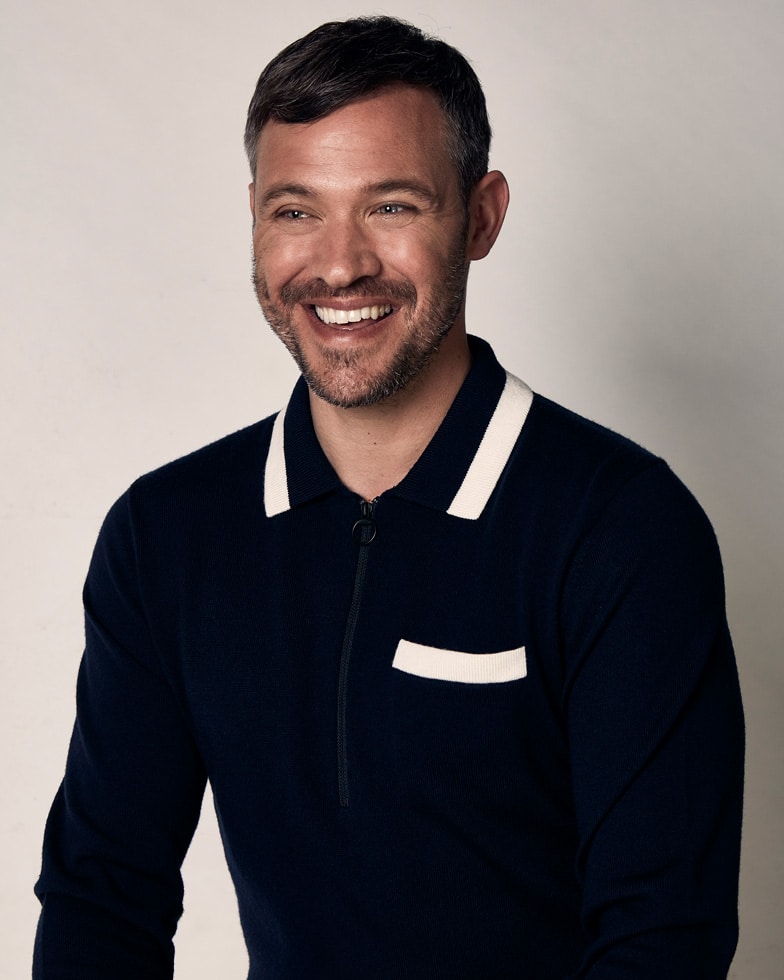
That sense of being sure of who he is as an artist has come hand-in-hand with his increased confidence in being an openly gay pop star. Although Will pushed to publicly come out following his Pop Idol win back in 2002 – “no-one could stop me,” he asserts – navigating a career in mainstream music while being open about his sexuality hasn’t always been an easy journey for him. “I think I was really ashamed of it to be honest,” he admits. “I’d say that 75% of that was my own stuff, and then getting older and being more confident, that’s naturally just going to come out in anything that I do creatively.” He stops. “I would also say that if I look back on how it was – even 10 years ago – there was no nurturing for it. Some of that shame was also people repressing me. If someone would ask about a boyfriend, the PR would step in and be like, ‘No!’ I was very angry about that for a few years. I dealt with it and actually met up with an old person who used to do my press and was like, ‘I need to tell you this because this is what was going on and I’m quite angry about it now to look back on it.’ She took it really well. It wasn’t easy at all.”
It was when LGBTQ people began started winning long-fought for rights – from legal protection against workplace discrimination, to equal marriage – that Will felt more empowered to push back. “It was the change in laws that started to make me think, as an employee in a sense, you can’t stop me doing that anymore,” he says. “The compost has changed. Then I’d say in the last, probably two years, I’ve become even more confident as an LGBTQ artist.” He also puts that down to increased visibility in the mainstream. “That’s what it’s about really. It’s still going to be difficult. Of course it will because you’re still in a minority and people want to push you into that.”
Is that because record executives still believe the myth that only LGBTQ people connect with LGBTQ artists? “Totally, and they want to push you into that,” Will says. “Not every record label sees it like that, and even now they are more savvy. People are more savvy. When I interviewed Sam Smith, my niece said she didn’t even know he was gay until I did the interview with him. We don’t care about it as much as we used to. I remember when I used to go to Holland right after Pop Idol about 18 years ago, no-one ever asked me once about my sexuality. They literally didn’t even care. So I think we’re getting there now. It might come up in passing like, ‘Do you have a boyfriend?’ but now it’s completely different.”
With that in mind, I ask Will how the music industry could better protect queer artists in 2019. “They’re still living in a heteronormative, patriarchal society. And they’re still most likely growing up with gay shame, because that’s a huge thing,” he says. “That starts from the family and school and still being in an overarching society where you don’t feel safe. I think safety is the key actually. That’s what is coming up for me. I think it’s really important for an LGBTQ person to feel like they’re safe. So to nurture that, I think they have to express themselves in any way they want to. If that’s how you want to express yourself, then we are here for you. But also we’re not going to put you in a box as an LGBTQ artist, you’re just an artist. That is probably the next step.
“I suppose it is a difficult thing because everyone wants to be as successful as they want to be, and an artist wants to get their work out to as many people as possible,” he adds. “I think that’s fair to say. Are we still in a time where if you have a female artist who’s kissing her girlfriend in the video, is that going to get less views? Or a man kissing another man? I suppose the answer is probably yes if you’re just doing the numbers. But I do think that’s actually getting better and better. I speak to my niece’s generation and it’s just not a big deal. They don’t care. They don’t see it as disgusting. That’s the big thing, isn’t it? When people say, ‘Oh, it’s disgusting to see that.’ I don’t think that disgust is as around with the new generation of kids than it was in my day, and that’s a really good thing.”
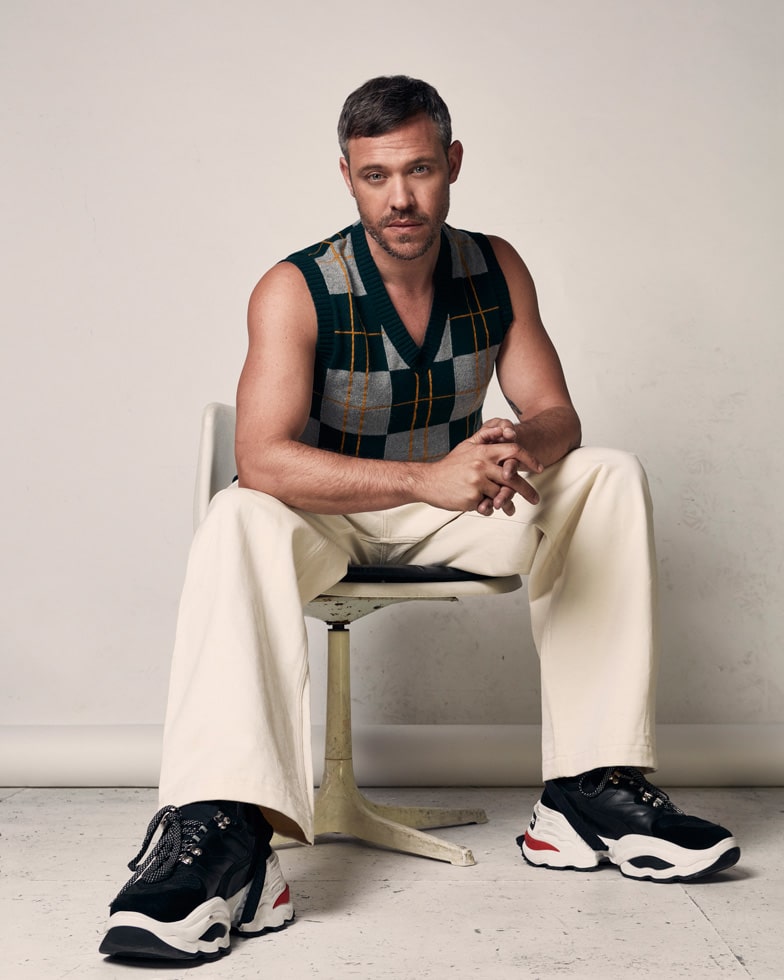
With this new era of equal rights for LGBTQ people, subscribing to a heteronormative lifestyle became an obtainable prospect. Will once mentioned that by the time he turned 40 he saw himself with a husband, a few children, and some chickens. I propose that the next thing we as queer people maybe have to overcome is aspiring to the heteronormative agenda we’ve been conditioned to dream of. Essentially, it shouldn’t be used as a barometer of success or failure. “Of course there’s that idealism that you marry and have kids,” Will says. “I think, just because one is gay, you’ve still grown up in that environment so when it came to the fact we could get married – and even that sounds so archaic now – it was great because I never thought I would get married or have kids from the age of six. I had shut it off, so when the door came open again it’s like, ‘Oh wow, maybe I can do that.’ But now, people are thinking, ‘Well, did I ever actually want to do that in the first place? I might have been conditioned to think that.’
“One of the best things about being gay for me is always questioning. If you’re on the outside, you’re immediately questioning the mainstream. Which is why I also think LGBTQ artists are so fantastic. They’ve always driven things from outside the mainstream.” He stops. “Yeah I’m 40 and I thought, ‘Oh that could have happened’ and it hasn’t happened, and I’m like, ‘Okay fine, it doesn’t matter.’ There’s probably less pressure on me because I’m gay, which would have been put on by society that I’ve then internalised, to be in a certain position, and I just don’t see it like that. A lot of my sexuality is the reason why I question things and only do things that I want to do. You’ve got to be strong when you know you’re born wanting to be with same-gendered people. So it makes you question everything and it’s the best thing ever.”
And more importantly, I add, it doesn’t necessarily lead to a single life of misery and loneliness like many would have you believe. “No, it’s the opposite,” Will smiles. “And it’s so liberating because you can really be an individual. And I think what’s happening now – you can really be an individual within the LGBTQ community as well. We’re beginning to celebrate people’s individuality a lot more, and their queerness and how they identify with that. That is really exciting. Whereas before we were quite prescriptive in how we should be, and not actually that loving towards each other. There were tribes, but I feel like the LGBTQ community has become a lot more loving. I certainly feel like that. Particularly watching programmes like Pose, I’m just like, ‘Oh my god, they were all there for each other.’ Where has that gone? Let’s revive that and extend it even more so.” Now that sounds like queer spirit to us.
Photography Jakub Koziel
Words Lewis Corner
Fashion Umar Sarwar
Hair Sven Bayerbach at Carol Hayes Management using Mr Smith
Makeup Cassie Steward using NARS Cosmetics
Fashion Assistants Jack O’Neill and Tara Pertwee







